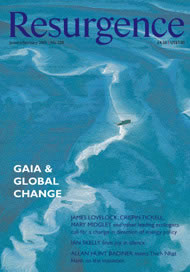THE ETHICAL implications of global change are drastic but not hopeless: something can be done. When people feel really threatened, their moral perspective can change quite sharply. It goes into emergency mode. This happened in 1938. Faced with the threat of war in Europe, people suddenly became more realistic and co-operative. The threat of climate change is not yet clear to many people today. Yet it is actually a worse threat than any that the human race has yet had to face, and it will surely soon become visible. When it does - when we see the need to adapt to it - our tradition already contains ways of thought by which we can do so.
The main trouble is that ever since the Enlightenment we have had a secular ethic that has worked to confine our morality strictly to human affairs. This ethic still resists even the extension of moral consideration to other animals. Thus, the UK's Charity Commission still has a rule that it will only recognise charities that are devoted to human welfare. Even venerable bodies such as the RSPCA only count as charities on the rather twisted pretext that they prevent cruelty, which is bad for the humans who practise it.
Accordingly, going beyond animals to plants and ecosystems has been quite outside our official ethic. The thought that we might owe something to the enormous system that has made us and keeps us alive is right outside its terms of reference. Its main prophets, from Bacon through Marx and Freud to Derrida, have taken the rest of the biosphere for granted as an infinite resource, a simple, unchanging background to the complexities of human life.
This exclusively humanistic ethic rests on an ancient imaginative vision of the whole universe as centring on human beings. But this confidence has turned out to be mistaken, which is why we need to change our imaginative vision. To do that we will have to work on an imaginative level as well as a scientific one. Neither works in isolation. Limited arguments from within the existing moral pattern won't change the vision because that pattern takes for granted a certain general picture of how the world is. The two have to change together; facts and values are not radically separate. People sometimes talk as if 'values' were isolated items that could be chosen or rejected one by one, separately from any connection with facts.
But facts can't be seen if they don't accord with the general vision. For instance, the notion of justice that is found in slave-owning societies is bound to be different from the one found elsewhere because those societies have a different notion of what a human being essentially is. In that society facts about the lives of slaves cannot easily be grasped because slaves themselves are not fully visible, not counted as quite real. The same is true, of course, of people viewed as enemies in wartime.
Similarly, facts about the state of our planet which clash with our current notion of human dignity - a notion that gives us the right to exploit the whole of nature without limit - often cannot be taken in at all. That strong, colourful addictive picture of our place in the cosmos has to be changed to admit them. The British government's chief scientist, Sir David King, started such a change when he pointed out the obvious truth that global warming is a more serious danger than terrorism. The reason why the government reacted by repeatedly trying to silence him was that he had spoilt their simple brightly coloured poster of a world centred on the 'war against terrorism' by setting it in perspective against a wider background that dwarfed it.
HISTORICALLY, WITHIN THE scientific culture, profound awe and reverence for the physical world have been a central element, and are still now. As Einstein put it, "in this materialistic age of ours the serious scientific workers are the only profoundly religious people." And though people don't talk in quite those terms at present, most serious scientists surely still do share Einstein's vision - which was also that of Darwin - a vision of nature as a tremendous whole that has given rise to our being, and of the Earth in particular as a magnificent system that supports life and is the immediate source of everything in it that we value. That vision is the logical outcome of both the scientific and the religious elements in our tradition. Until lately, those elements were not seen as conflicting, and on this point they surely don't need to.
I want to emphasise that there is nothing wrong with visions as such; nothing wrong, in particular, with scientists being visionaries. The greatest of them always have been so. The difficulty lies not in avoiding visions, but in getting the right one. Today a number of misleading visions are being advertised as having the authority of science. I'll give three examples:
The Economist's or Banker's View
This shows the globe as hollow, like those toy spheres where beads go round on wires, the beads in this case being money and the things that money buys, and the nodes at which they meet being markets. Thus the economy appears as the fundamental reality, and the ecology as a minor sub-system within it.
Gaian thinking reverses this order, showing the solid globe with its whole great system of interacting biota as the reality, and the behaviour of men in markets as merely one somewhat aberrant part of it that needs to be brought into sync with the rest of the system before it causes a breakdown.
The Biologist's View
The myth currently presented here is a one-sided outgrowth of Enlightenment individualism. It presents the biosphere as simply an arena for competition, ignoring the deep level of co-operation that is always necessary before competition can even get off the ground. Its mascot is the Selfish Gene, and it is afloat in imagery drawn from the stock exchange.
Like the Economist's view, with which it has deep links, this vision is plainly a projection of certain social pre-occupations of our present culture - aspects of our current commercial system which will look very odd to future historians and already look odd to those who do not share them. It too reads the world as if it were just a mega-market, a simple society of markets. It is mysteriously blind to most of the obvious facts about the biosphere, notably its extreme fragility.
The Cosmologist's View
This is rather different. It is, I think, more of an escape-fantasy than a glorification of our present way of life. It starts from a strange prejudice (dating back to Pythagoras) which one might call sky-snobbery - a willingness to admire only the parts of nature that are a very long way off.
From this angle the Earth itself is seen as rather a waste of time. Helped by the science-fiction writers, these cosmologists have enabled our secular value-system by telling us that we can deal with the problems of the Earth by simply leaving it. If we have difficulties here, we can move away to somewhere better in outer space. Interestingly, too, these prophets propose that, for this flight, we should transform ourselves away from our present earthly form and lose our earthly bodies.
It should not need to be pointed out that this is no way for sane scientists to go on, but quite a lot of them have done so. In fact, there is nothing in the least new about eminent scientists being visionaries, nor about their visions being influential. We don't need to avoid visions. We need to get the vision right. The Gaian vision is the one that we need if we are to make any sense of our current situation.








